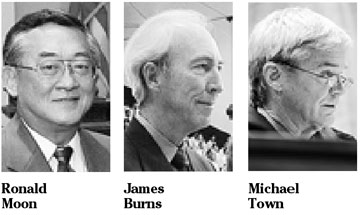Age-70 retirement dismays Hawaii judges
Forcing Hawaii judges to retire from the bench at age 70 means the state will be losing a significant breadth of experience in the next decade, said one judge who is facing retirement.
On Tuesday, Hawaii voters soundly defeated a proposed constitutional amendment that would have allowed judges to remain past age 70, subject to retention.
Seven judges, with a total of 268 years of legal experience, will be forced to retire in the next six years, most a few years shy of their 10-year terms.
"We're losing people who really have vast legal experience both as lawyers and judges," said Maui Circuit Judge Shackley Raffetto, who turns 70 in 2012 and publicly supported the repeal.
Most judges who are appointed at age 55 have enjoyed a legal career of 35 years and have retained a tremendous amount of experience and subject matter, he said. "Justice is about knowing and applying the law and common sense and life experiences."
Because of the age cutoff, Raffetto loses two years on his term.
"Once I make 70, I won't be able to continue part time or sit as a judge in a judicial capacity," said Raffetto, who started the first Drug Court on Maui.
Most judges prefer to serve two terms or 20 years to maximize their retirement, he said. The mandatory retirement age is not only arbitrary, but it could be a deterrent to attracting senior members of the bar who have so much to offer, he said.

5 WHO ARE LOOKING AT CURTAILED CAREERS
Judges who will become 70 before their terms expire are:
» Chief Justice Ronald Moon.
» Intermediate Appellate Court Chief Judge James Burns.
» Oahu Circuit Judge Michael Town.
» Maui Circuit Judge Shackley Raffetto.
» Big Island Circuit Judge Matthew Pyun.
|
|
Raffetto had served seven years as a per-diem judge before he was appointed to the Circuit Court bench at age 52.
"I knew if I wanted a second term, I wouldn't make 20 years, but it was close and that was enough to make it an OK career change," he said.
Raffetto had supported the repeal, saying the requirement and those who support it perpetuate discrimination.
"We should honestly recognize this age prohibition for what it truly is: age discrimination," he said.
Although the U.S. Supreme Court has said it is not unconstitutional for a state to place age limits on high public officials, "it doesn't make it right morally, and we shouldn't be doing it in Hawaii," he said.
Arguments that the mandatory retirement needs to be studied further is disingenuous, he said.
The board of directors of the Hawaii State Bar Association had opposed the repeal, noting the issue needed to be looked at more. "The board felt there were pros and cons and it was a complex issue better suited for more review," said Lyn Flanigan, executive director.
In their discussions, the board deliberately avoided looking at politics or the individual judges affected. Among the questions that arose is what should be the age cap, whether there should be different age caps and how the Judiciary could continue to utilize the experience and knowledge of judges who turn 70.
"I think what they ought to do is re-address it in a way where they don't lose the benefit of the use of judges who are 70 or over, either allow them to continue to serve or in a more limited capacity," Raffetto said.

